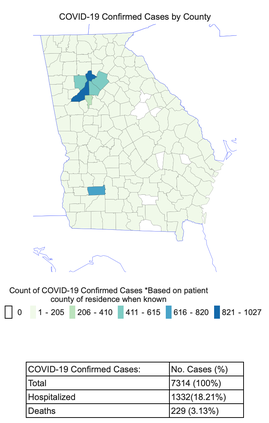MONROE, Ga. — Fewer than 1 in 4 tests for COVID-19 in Georgia come back positive for the illness.
That’s according to a state Department of Public Health official, who answered some of the questions The Walton Tribune and The Covington New have received from readers in recent days about the pandemic.
Nancy Nydam, a spokeswoman for DPH, said the state’s lab has returned 448 positive cases out of the 2,497 tests for the illness caused by the novel coronavirus.
Commercial labs have returned 6,866 positive tests out of 28,777.
Overall, about 23% of tests in the state confirm COVID-19.
As of noon Monday, Georgia had 7,314 confirmed cases, including 62 in Newton County.
There were 229 deaths, with two of them in Newton. The first was a 61-year-old man with underlying health conditions while the other was a 85-year-old man. Health officially don't know if the 85-year-old man had underlying health conditions.
The number of cases in Fulton County, Georgia’s largest, topped 1,000 in the noon Monday report. But a much smaller county, Dougherty, in southwest Georgia, had the second-most cases at 716. Dougherty has recorded 31 deaths — the most of any county in the state — to Fulton’s 28.
The Georgia Public Health Lab is getting results in 24 to 48 hours, depending on how long a facility returns specimens. Nydam said commercial labs are running a week or longer to report results.
Nydam said there was no accurate way to track recovery from COVID-19.
As of noon Monday, the vast majority of cases in Georgia were among adults. Of all cases, 35% affected patients 65 and older and 60% were in patients 18-59.
Female patients made up 53% of the confirmed cases.
Hospital questions
A spokeswoman for Piedmont Walton Hospital said she was unable to answer many of the common reader questions about the state of the Monroe facility. The same can be said for Piedmont Newton Hospital.
Sydney Walker, communications specialist for Piedmont Walton, said she was unable to answer if any COVID-19 patients are being treated at Piedmont Walton, or discuss use of intensive care unit beds or ventilators.
Walker previous cited the federal privacy law known as HIPAA, the Health Insurance Privacy and Accountability Act, as well as respect for families for refusing to disclose causes of death.




